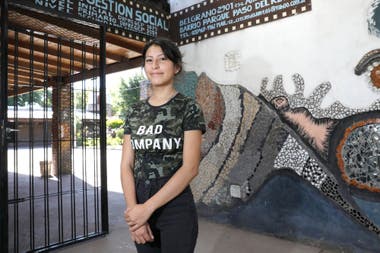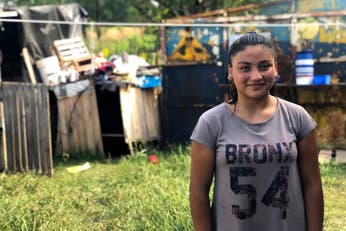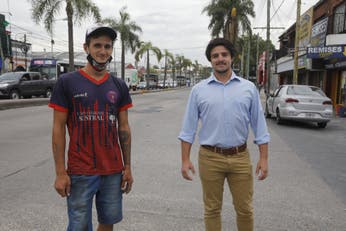Five out of 10 young people who did not finish high school are mothers or fathers, according to the latest report on education from the Argentine Social Debt Observatory (ODSA) of the UCA.
The figures show how
teenage pregnancy, motherhood and fatherhood are one of the main causes of dropping out of school
. But, also, another consequence of the lack of access to education as a result of poverty and social inequality.
Once pregnancy and maternity or paternity are completed and these adolescents are still in school, specialists emphasize that containment and accompaniment measures are essential to prevent them from leaving school, such as maternity wards or a restructuring of careers. schoolchildren.
According to the ODSA report, the experience of having been a mother or father affects the continuity of studies in all socioeconomic strata, although the chances of leaving school are doubled in the most vulnerable: 60% vs. 35.2% of the most affluent sectors.
Generally speaking, early motherhood and fatherhood affect girls and boys differently.
While for boys it implies, in many cases, dropping out of school to start working, for teenage girls it also poses risks to their health.
Complications during pregnancy and childbirth are the second leading cause of death for young women between the ages of 15 and 19 worldwide, according to the World Health Organization (WHO).
In 2018, 232 children per day were born in the country to mothers under the age of 20. And six children a day from mothers under the age of 15. To complete the picture, seven out of 10 of those pregnancies were unintentional,
according to the latest data from the Ministry of Health of the Nation and the National Plan for the Prevention of Unintentional Pregnancy in Adolescence (ENIA).
Regarding the impact on education, official figures indicate that more than half of adolescent girls with children (55%) had already dropped out of school before their first pregnancy.
In this sense,
lack of information is one of the factors that influence unintended pregnancy in adolescence.
In a recent report, the United Nations Population Fund highlights three others: lack of access to comprehensive sexuality education, adequate sexual and reproductive health services, and free and effective contraceptive methods.
The school, a key role
Natalia Leguizamón Areco is 19 years old and lives in Moreno, in the western area of the Buenos Aires suburbs. She became pregnant at 16, when she was 50 in high school. She had been dating girlfriend Alan for three months, a boy from the same school. “We hardly knew each other. It was a mistake, we were very scared,” he recalls. First, they told her mother and then reported it at school. Both went to the Creciendo Juntos social management school in Paso del Rey, whose role was key for them to be informed, decide and finish their studies.
We hardly knew each other. It was a mistake, we were very scared
Natalia Leguizamón Areco
Natalia had a risky pregnancy, for which she remained several months at rest. Both during that period and after the birth of her son Mayron, the institution designed together with her a course study plan, part at school and part at home, so that it could finish. They even allowed him to make the 60 trip with Mayron. Today, Natalia lives with Alan and her son in their in-laws’ house. Alan still owes some subjects, because he had to start working as a bricklayer to support the family.

Teachers and specialists agree on the importance of access to Comprehensive Sex Education (ESI) as a way to guarantee the rights not only to education, but also to health and sexual rights
. They consider it essential to provide information, create bonds of trust and accompany them in making autonomous decisions. And they emphasize the key role of adults, both at school and in families. “Autonomy is not loneliness,” says Mariana Vera, coordinator of the School Retention Program for the city of Buenos Aires (CABA). “Access to the rights of adolescent girls and boys must be accompanied by adults,” she adds.
Autonomy is not loneliness. Access to the rights of adolescent girls and boys must be accompanied by adults
Mariana Vera
The program that Vera coordinates is 20 years old. In its first decade, it focused on guaranteeing the right to education. However, with the ESI law, it was expanded and now they also deal with access to health and sexual rights.
“Almost 10 years ago, at school the questions changed,” explains Vera. And he details: “For example, how to listen to the news of the pregnancy? Give him the possibility of thinking, doubting, choosing. We are interested in being able to arrive earlier in the decision-making process regarding his body, in access to reproductive rights and non-reproductive. ”
Some of the Buenos Aires teachers consulted affirm that the application of the ESI “depends more on the will of the teachers than on a public policy with human and economic resources.” “There is no accompaniment or training on how to approach the issues,” says Natalia Hernández, secretary of Women and Gender of the Suteba de La Matanza teaching union.
For specialists, care spaces for students’ children are essential.
In the city there are 34 maternity wards for children of students, called early childhood spaces, which are distributed in 25 institutions. For its part, the province of Buenos Aires has had maternity wards in secondary schools since 2008. However, until now the scope is limited. In total there are 94 rooms, which represents 4% of the state schools in the province -including the Buenos Aires metropolitan area- and 2% if private schools are also counted.
On the role of maternity wards, Cecilia Litichever, Education officer of Unicef Argentina, says that from that organization they support the development of a program in Tucumán that links secondary schools with maternity wards. “From the implementation of this program we can see how the permanence in school of adolescents who go through a situation of maternity or paternity has a strong impact on their life trajectories,” he says.
According to the UNICEF reference, many girls and boys could not have studied had these care spaces not existed. ”
They recognize that attending high school while their children are in a room gives them a lot of peace of mind and allows them to continue their studies and obtain, as one of the girls said, something that ‘nobody will ever take away’ which is a secondary degree. And that has a huge impact on their lives
”
FURTHER
.
Publicado en el diario La Nación




